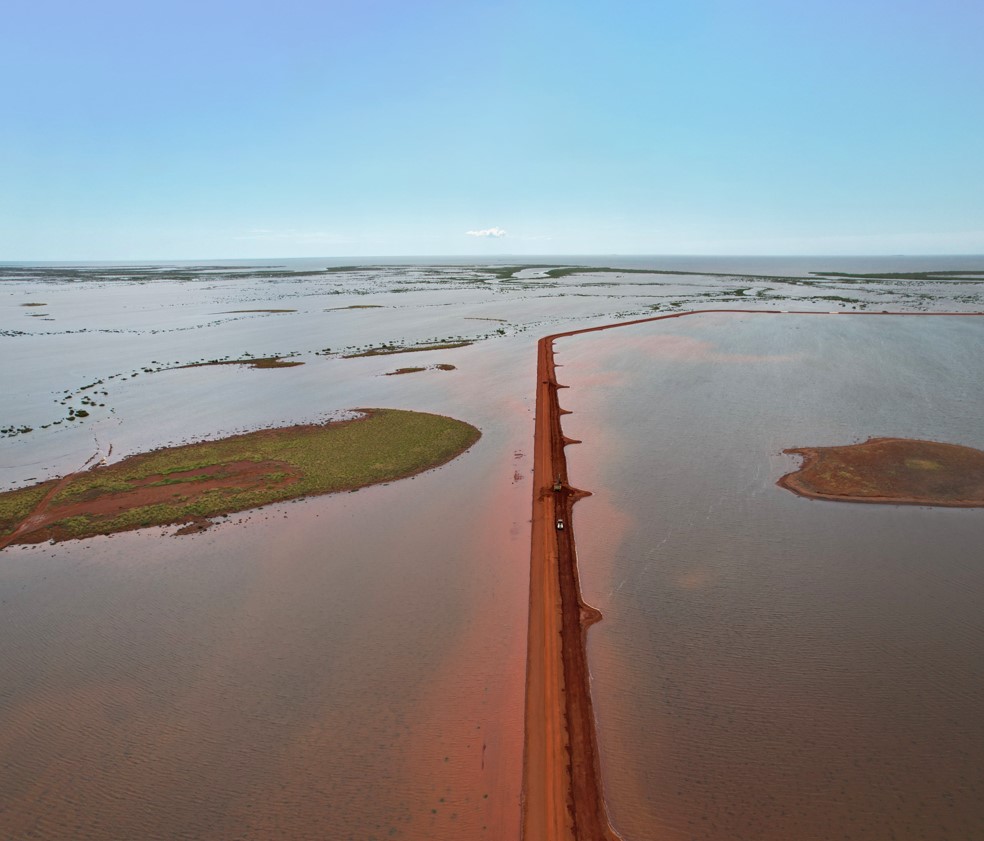Salt of the earth
With a size and scale that’s turning heads, the future-focused Mardie salt operation and potash project is ready to make waves, both domestically and on the international stage. It’s an operation with an impact that extends far beyond mining, delivering economic benefits and creating jobs in the long-term.
Salt has a long and stable history as a strategic mineral used in the manufacturing of thousands of products like toothbrushes, smartphones and drones, newspapers, the clothes you’re wearing and the glass you drink from.
Importantly, it’s at the forefront of the energy transition as a key mineral in the development of clean technologies like solar panels and sodium-ion battery systems.
The unique blend of scale, innovation and sustainability positions Mardie as a key supplier to international markets, especially in Asia. Given the growing global supply shortage for industrial salt, Mardie’s importance can’t be overstated.
The Pilbara region of WA is picture-perfect for salt production.
In salt production, the sun and the wind do most of the work, requiring conditions that allow for high evaporation, like that in the flat and dry Pilbara. Plus, its proximity to the coast and international markets means the prime products can be leveraged more easily for export to major markets and across the country.
BCI Minerals is looking to supply potash as well, a commodity essential to our food supply as a major input for fertiliser. As a country with a robust domestic food supply, Australia needs to guarantee a sovereign supply chain. But as a net importer of the mineral, having an onshore producer could be a game changer.
Mardie is looking to stand the test of time, with a 60-year operational life that will see the miner contributing over $4.8b to GDP and creating more than 1000 jobs for the Pilbara.
With an expected annual production of 5.35mt of industrial salt every year, it’s certainly an operation of substance. But Mardie isn’t just about size, it’s also about innovation. It boasts state-of-the-art processing facilities and dedicated logistics infrastructure, set to deliver high-quality industrial salt efficiently to customers. And, with over 99% of the production process powered by the sun and wind, it’s clear BCI Minerals is focused on the legacy the operation will leave in the region and beyond.
“Mardie is set to be around for a good long while, not just adding to GDP but also creating over 1000 jobs,” Mr Boshoff said.
“We’re thinking about the long-term legacy of this project. It’s about shaping the next generation.
“Many operations have shorter life spans. We have to think about not only what will happen in the next 10 or 20 years, but how it’s going to be shaped for the next generation.
“Legacy is key in building such an operation, not only in the way that we build the asset itself, but also in how we engage with the community and traditional partners.
“I won’t be around in 60 years’ time, but the younger generation will still be around, so we have to consider the long-term and that requires a different mindset.”
With $981m secured through a syndicated facility agreement (SFA), involving big players like the Northern Australia Infrastructure Facility (NAIF), Export Finance Australia, Export Development Canada, Westpac Banking Corporation and Industrial and Commercial Bank of China Limited, Mardie’s future is looking bright. These funds are set to be used for the salt-first component of the operation.
Even as it’s being built, Mardie is already proving its worth. Construction is tracking nicely, over 69% complete at the end of June and within budget. This hasn’t gone unnoticed among key stakeholders, with BCI Minerals spending more than $26m with local businesses and more than $11m with Indigenous companies in 2024.
The relationship BCI has with the Pilbara is mutually beneficial, as Mardie’s prime location gives it a leg up in terms of export capacity. With a multi-user port providing direct access to export markets, it’s a boon for the region.
As the first of its kind in decades, BCI has been able to introduce innovations to help the miner become more competitive.
One such innovation is the design of Cape Preston West Port, sporting a 2.4km jetty and transhipment system that positions BCI as the only Pilbara-producer capable of loading ocean-going vessels up to Newcastle Max size.
“These are very large vessels that allow us to have a reduction in cost per ton, which makes us more competitive and enables us to deliver for our customers in Asia,” Mr Boshoff said.
“Given the port will have surplus capacity of up to 14.5mtpa, we’re inviting third parties to express their interest in accessing the spare capacity.
“The Pilbara is quite tricky for small operators to export, and we are hoping to play a role in bringing some of those small operators to market in the near future.
“Not only will we be able to assist other operators in the region, but we will also be able to help drop their transportation costs to be globally competitive.”
Demand for high-grade industrial salt in the Asian market is predicted to rise by around 40mtpa by 2030 — a demand Mardie is well-placed to meet. With three binding offtake agreements already in place, BCI Minerals is ready to meet about 62% of the first three years of projected production.
Mardie’s commitment to sustainable development aligns perfectly with BCI Minerals’ core values. Over 99% of the energy needed to produce salt and potash at Mardie will come from the sun and the wind.
BCI is going beyond operations, ensuring it supports the communities where it operates.
The miner has signed a new partnership agreement with Karratha Senior High to support the Positive Behaviour Support (PBS) Program.
The program rewards students for positive behaviours with a points-based system, encouraging a strong school culture through recognition and incentives.
BCI’s funding will help upgrade the school’s rewards shop and add exciting new prizes, including a bike, gift vouchers, canteen treats and even a fishing rod.
BCI is also well-aware of the challenges remote Australia faces. When higher education means moving 1600km away, many young people in the Pilbara face a tough choice: leave their families and community behind or miss out on a university education.
To address this challenge, BCI funds two scholarships with Pilbara Kimberley University Centres to support students residing in the City of Karratha or Onslow.
Five students will be able to access $1000 through two scholarships. These scholarships will support recent high school graduates and those undertaking studies in the field of Allied Health or Nursing.
With innovation and sustainability at the core of operations, BCI is proving it is worth its salt.
























